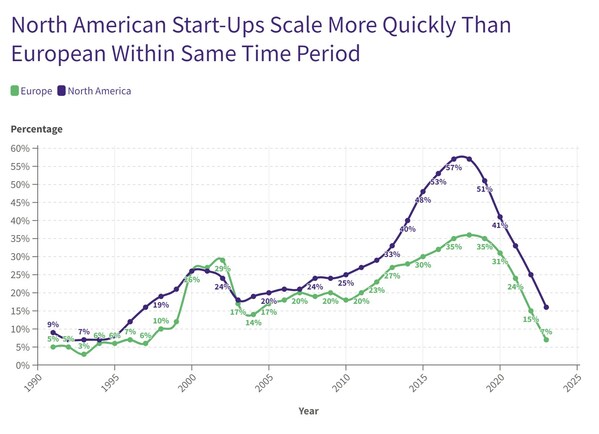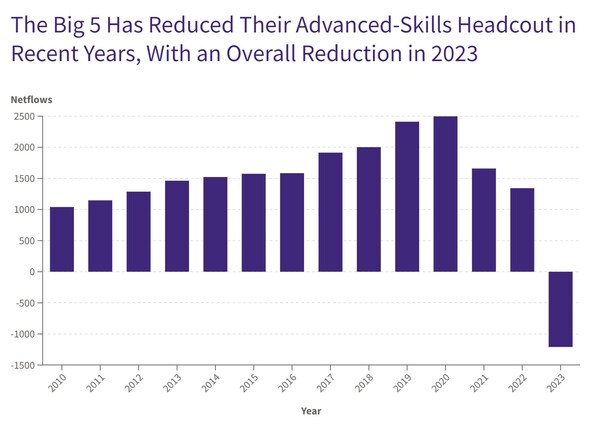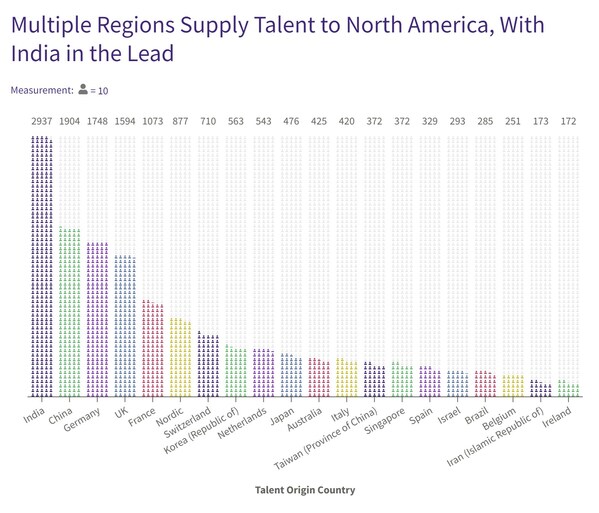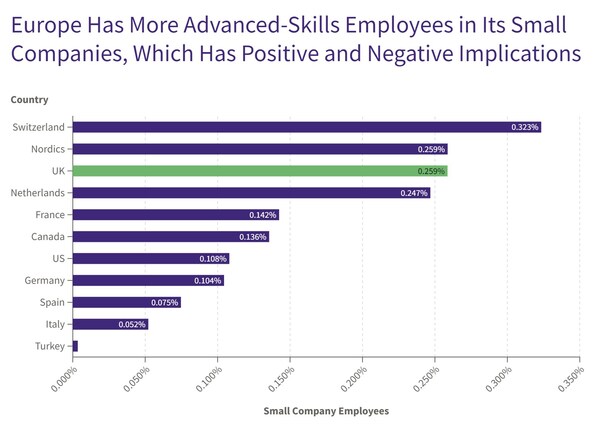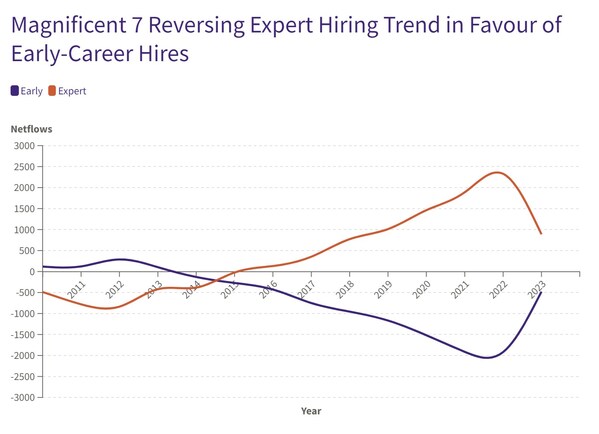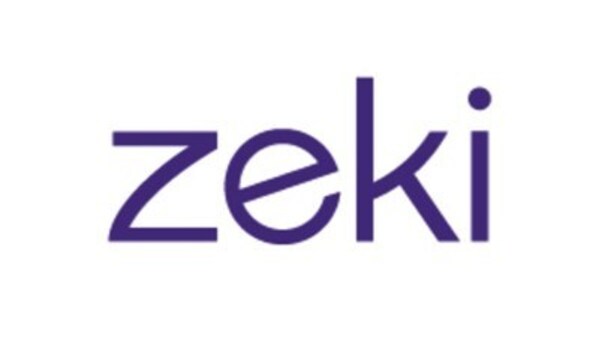 |
新しいZekiデータレポートがディープテック・エコシステム内の競争を分析
ロンドン, 2024年9月25日 /PRNewswire/ -- 本日、Zekiデータが発表したディープテック人材に関する最新のグローバルレポートによると、米国は英国の3倍のディープテック企業を生み出している一方で、欧州の小規模なスタートアップは、北米に比べて高度なスキルを持つ人材の割合がはるかに高いことが明らかになりました。
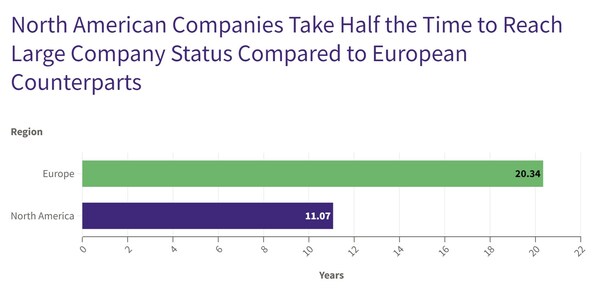
「ディープテック分野における人材争奪戦:欧州対北米の対決 2024年レポート」は、欧州と北米におけるディープテックの根底にあるトレンドを、人材という視点を通じて解明しています。レポートは、2020年以降、新たなディープテック企業の増加が著しく減速していることを示しています。
Zekiデータは、ディープテック企業の将来性を評価し、投資や人材獲得の指針を提供する英国拠点のディープテックデータ企業であり、同社のレポートによると、各国は次の国家繁栄と安全保障を支える変革技術の分野で、主権能力を構築するために、優秀な人材を引き付け、維持する必要性に目覚めつつあることが明らかになりました。
「ディープテック企業がイノベーションの目標を達成するために必要な限られた科学技術分野の人材を巡って、激しい競争が繰り広げられています。」とZekiデータのCEO兼共同創業者であるトム・ハード氏は述べています。「各国政府は、革新的な優位性を確保するためにディープテックのスタートアップに多額の資金を投入していますが、Zekiデータによると、高い資本コストや市場統合という逆風の中で、ROI(投資利益率)は限定的であることが示されています。」
「最も革新的な人材を引き付け、維持することが、ディープテック企業にとって将来の革新の可能性を示す最良の指標です。」とハード氏は付け加えました。「これは、国や企業にとって最優先事項であるべきです。」
「ディープテック分野における人材争奪戦」レポートは、これまであまり研究されてこなかった欧州および北米の6,100社以上の主要なディープテック企業の進化と、各企業が新技術を習得する競争の戦略的影響に焦点を当てています。Zekiデータは、これらの企業が世界的に雇用する8,795,902人のうち、特に高度なスキルを持つ227,948人に注目しました。
主なZEKIデータレポートの調査結果
1.政府投資はスタートアップ成長の促進にはつながらず:2020年以降、欧州および北米における新たなディープテック企業の設立は劇的に減速しています。各国は、ディープテックのイノベーションを加速させるために大規模な財政投資を行ってきましたが、効果を上げるには至っていません。高い資本コストや市場統合という逆風が、政府の産業政策の効果を弱めています。
2.マグニフィセント・セブン 低コストの採用を最優先している:生成AIによる市場統合が、Amazon、Apple、Google、Meta、Microsoft、Nvidia、Teslaの各社で劇的な採用の変化を引き起こしています。ディープテック企業は、初期キャリアの低コスト人材を優先し、コストの高い経験豊富な人材を削減しています。
3.米国のスタートアップは、欧州のスタートアップより2倍速く成長する:米国のディープテックのスタートアップは、欧州の同業他社に比べて2倍の速さで成長しています。
4.エンジニアリングバイオロジー企業はスケールアップに苦戦している:エンジニアリングバイオロジー企業は、中規模および大規模企業への成長に苦戦しているため、依然として魅力的な買収対象となっています。
5.バッテリー技術は崩壊した:2019年に始まったグリーンエネルギー分野からの人材流出に続き、再生可能エネルギー分野は人材の支持を失いつつあります。2022年以降、急速にこの業界から人材が離れていることが示されています。
6.ソフトウェアエンジニアリングが熱い注目を集めている:半導体、航空宇宙、防衛企業は、トップクラスのソフトウェアエンジニアを巡って激しい競争を繰り広げている一方で、多くのサイバーセキュリティ業界は、ソフトウェア人材よりも営業職を優先しているようです。
7.中国人材が西側諸国から流出している:国家レベルでは、中国のディープテック人材が西側企業から流出する動きが加速しています。中国は、欧州および北米のディープテック企業から離れる中国人材にとって、選ばれる主要な行き先として確固たる地位を築いています。
レポートの全文は、zekidata.com/talentwar にて無料でダウンロードできます。
Zekiデータについて
Zekiデータは、ディープテック企業の将来性を評価し、投資および人材獲得の指針を提供する英国拠点のディープテックデータ企業です。Zekiデータには、AI、量子コンピューティング、データエンジニアリング、半導体、ヘルステクノロジーなどの最先端分野を専門とする1,000万人以上のトップクラスの科学者、エンジニア、研究者が含まれています。企業はZekiデータを活用して、人材獲得プロセスやイノベーションパイプラインを最適化し、各企業におけるイノベーションの質、推進力、将来の方向性に関する新たな定量的な洞察を得ています。
同社は、各専門家を評価するために20のカスタマイズされた指標を開発し、その専門分野を詳細に分析し、専門家としての影響力、技術的な熟練度、キャリアの軌跡、野心、評判、将来の可能性を評価しています。同社のクライアント層は、投資家、企業の戦略担当者、HRチーム、政府機関にまで及び、各組織がZekiの洞察内容を活用して、進化するテクノロジー業界での競争優位を維持しています。
詳細については、www.zekidata.com をご覧ください。
インフォグラフィック - https://mma.prnasia.com/media2/2513003/Zeki_Research_1_Infographic.jpg?p=medium600
インフォグラフィック - https://mma.prnasia.com/media2/2512999/Zeki_Research_2_Infographic.jpg?p=medium600
インフォグラフィック - https://mma.prnasia.com/media2/2513000/Zeki_Research_3_Infographic.jpg?p=medium600
インフォグラフィック - https://mma.prnasia.com/media2/2513002/Zeki_Research_4_Infographic.jpg?p=medium600
インフォグラフィック - https://mma.prnasia.com/media2/2512998/Zeki_Research_5_Infographic.jpg?p=medium600
インフォグラフィック - https://mma.prnasia.com/media2/2513004/Zeki_Research_6_Infographic.jpg?p=medium600
インフォグラフィック - https://mma.prnasia.com/media2/2513005/Zeki_Research_7_Infographic.jpg?p=medium600
ロゴ - https://mma.prnasia.com/media2/2463194/Zeki_Logo.jpg?p=medium600
